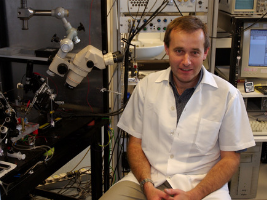With help from the Elizabeth Blackwell Institute’s MRC Confidence in Concept (CiC) Scheme Professor Julian Paton and his team co-led by Drs Angus Nightingale (Consultant cardiologist) and Emma Hart (BHF Fellow), are taking a bionic approach to modulating blood pressure.
In 2014, Professor Paton (School of Physiology, Pharmacology & Neuroscience, University of Bristol) and Professor Alain Nogaret (Department of Physics, University of Bath) received an Elizabeth Blackwell Institute TRACK Award to generate pilot data for an artificial neural network driven pacemaker. This device can also sense breathing, which modulates heart rate - this is known as Respiratory Sinus Arrythmia (RSA), a naturally occurring arrhythmia that induces variability in heart rate with every breath. They have now shown that RSA can improve cardiac output and save cardiac energy in heart failure paving the way for a potential re-think in cardiac pacemaker design. But the technology developed could have many other applications, including blood pressure modulation.
Professor Paton and Nogaret together with their spin-out company Ceryx Medical, have gone on to develop their device to enable suitability for a variety of applications within biomedicine, thanks to its unique ability: it uses biofeedback data in real time to modulate its output. Professor Paton has been granted an Elizabeth Blackwell Institute MRC Confidence in Concept (CiC) Awardto develop the Central Pattern Generator to regulate blood pressure and maintain it at a pre-programmed level in a a pre-clinical animal model.
Firstly, Professor Paton’s team managed to modify the device to generate trains of stimuli, the intensity of which was dependent on the input voltage. This was used to feed two outputs, switching between them dependent on the input voltage ranges, which corresponded to blood pressure levels.
In rat and conscious sheep in vivo models, these outputs could decrease (or increase) blood pressure when it deviated from a pre-determined level. The device was shown to maintain blood pressure levels constant. Lastly, the team designed and tested a novel wireless, implantable silicon-graphite blood pressure sensor which would potentially be used by the device to modulate its inputs, with promising results.
These data were used to gain further funding from Innovate UK’s Investment Accelerator Scheme and the Intellectual Property Group to undertake further development of the blood pressure management device, now named the Barostat.
So what’s next for the Barostat?
Professor Paton said, “The idea is to make the device more physiological. We will add more inputs to the device to trigger appropriate state-dependent changes in arterial pressure, but within physiological limits. The Barostat will be used to allow a physiological increase in blood pressure during exertion but prevent dangerous levels of arterial pressure, which can happen in exercise. Finally, it will be fitted with a diurnal clock to induce the natural day-night swings in blood pressure”.
